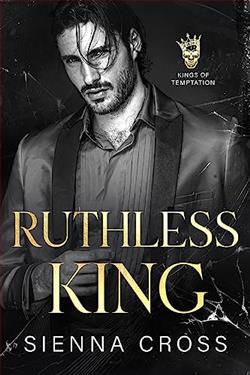Page 36 of Mission Shift
The breeze picked up, rustling the trees above us. For a moment, I thought I’d felt a raindrop hit my cheek, but it was only a cool gust. The clouds hung heavy and gray, threatening rain but mercifully holding back. I inhaled deeply, enjoying the earthy scent of the forest as we moved along a narrow trail lined with pine needles. There was a strange calm here. It was almost tranquil, and I could have relaxed if not for our dire circumstances.
Every so often, Braxton would glance at me as if silently checking to make sure I was okay. I met his gaze once, offering a small smile. We didn’t need words; we both knew the stakes. Our urgency drove us forward in determined silence.
By midafternoon, the ache in my legs had become a dull, constant throb, but still, I pushed forward. Braxton wiped at his face again, breaking the silence with a tired chuckle.
“So are we ever going to get there, or are we walking in circles?” he teased, though there was no real complaint in his tone.
“Soon,” I replied. The border was still a couple of hours away. “We’ll rest properly once we make it across. I don’t want to risk pausing to rest unless it’s absolutely necessary.”
He grunted in acknowledgment and adjusted the pack on his back. The fire in my muscles began to numb, as if my body had accepted that there was no point in resisting anymore.
One step at a time, we put more distance behind us.
The forest thickened as the hills grew steeper. Uneven paths covered in roots and stones made each step a hazard. My legs ached from the hours of jogging, walking, and scrambling through fields, but we couldn’t afford to slow down.
We pushed deeper into the forest, branches cracking beneath our boots. It was quiet here—no thwacking of approaching helicopter blades, no hum of distant vehicles—just the natural rustling of leaves in the breeze.
“We’re getting close to the border,” I explained, pausing to check my GPS again. “This area isn’t heavily patrolled because it’s too rural. It’s too difficult for their surveillance to cover everything. Smugglers and special forces use it mostly.”
“Well that’s good,” Braxton said, wiping sweat from his brow.
“But we can’t afford to get sloppy now. Even though the Russian military doesn’t patrol constantly, they do perform random sweeps.”
The dense forest offered us plenty of cover, but it also made visibility a nightmare. I couldn’t tell what might be waiting beyond the next rise or ditch.
I crouched beside a fallen tree to take a breath and pointed at a narrow path cutting through a shallow gully up ahead. “That’s the route. It leads to a stream that crosses into Ukraine. It’s not too deep and cuts between the two main trench lines.”
He nodded, asking softly. “What about sensors? Field cameras?”
“They’re more focused on the roads and known crossings. This section’s rough enough that they rely on patrols instead,” I explained, scanning the area. “We keep low, we stay quiet, and we move fast.”
“Got it.” His grip tightened on the straps of his rucksack, and he hiked it up higher on his shoulders. At least he wasn’t arguing with me like most men would have. I was glad he was willing to acknowledge that I understood this world far better than he did.
We crept forward across the uneven terrain. The dips and ridges provided plenty of cover, but they also slowed us down. Braxton’s boots slipped on loose patches of soil more than once, and each time, he tensed, glancing at me as though waiting for a sign that someone had heard us. I understood the paranoia—it was always there in my own mind, humming just beneath the surface—but thankfully, the forest remained eerily quiet. All I could pick up on was the rustling of the branches in the breeze and our muffled breathing.
Suddenly, I heard something coming straight for us and stopped dead in my tracks. I shot my hand out to stop Braxton. He halted immediately, his eyes following my gaze. I tilted my head, listening intently. Something was definitely moving through the trees up ahead. I tensed, expecting to see a patrol or maybe a drone. Instead, a roe deer burst out from behind a patch of dense brush, darting across the path only a few meters away. It barely acknowledged us, its hooves thudding rapidly on the forest floor as it moved off to the west.
Braxton exhaled in relief and started to say something, but another deer appeared, leaping so closely in front of us that she kicked leaf debris on our pants. I stood still, watching the animals’ movements as they slowed and took in their surroundings. They were skittish, but that was their nature. If there had been any real threat nearby, they wouldn’t have been this calm.
“Damn,” Braxton muttered, straightening beside me. “Didn’t think we’d get a National Geographic moment out here.”
I rolled my eyes and resumed walking. The path started to narrow and was soon winding erratically through the dense trees. The gentle murmur of the stream grew louder, guiding us forward. We were close to the border now. A taut, invisible line of tension stretched between us and freedom.
We just had to cross it without getting caught. Easier said than done.
The stream cut through the dense forest in a narrow, swift current, its surface catching the dim light of the setting sun. I kept close to Braxton while we moved cautiously along the bank. Every step sent a sharp ache through my legs, and my pulse drummed steadily in my ears. We were close now—too close to make any mistakes.
“There,” I whispered, pointing ahead where the stream curved sharply. The faint outline of a simple old-fashioned barbed-wire fence was just visible through the thick undergrowth. The strands of the fence were loose, tangled in vines, and sagging in sections. “That’s where smugglers cross. It’s easy to breach here.”
This was it—the border between Russia and Ukraine. My senses were on high alert, and my hand rested near my Glock, every instinct screaming that something could go wrong at any moment. Just because there were no signs of patrols, it didn’t mean we were safe.
We crept along the bank, our boots barely making a sound on the soft ground. The stream’s gentle babble masked the noise of our movements. Soon the opening in the fence came into view—a gap where the barbed wire had already been cut and pushed aside.
“Go,” I whispered, signaling Braxton forward. “We’re exposed here.”
He nodded and stepped carefully through the gap, navigating across the moss-covered rocks. I followed, the icy water seeping into my boots as I crossed. The mud on the opposite bank made the climb slippery, but we both managed to scramble up without incident.
Once we were clear of the stream, I turned to Braxton and gave him a brief smile. Relief flickered in my chest, but we couldn’t stop in this area.















